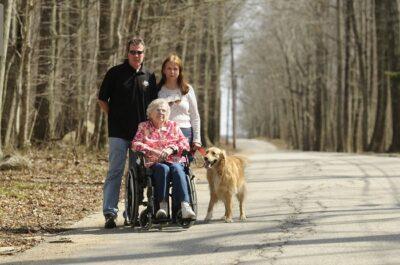
Image source: Hartford Courant
Reclaiming land taken through eminent domain can be nearly impossible. Carolyn Sheehan learned this the hard way and is still fighting to get back 11.3 acres taken 27 years ago for a freeway that was never built.
The state of Connecticut has refused to return the property even though Sheehan has offered to buy it back. Sheehan’s family has even tried to trade the state another piece of property for the land, but to no avail.
“I’d like to buy it back. We’ve always wanted to,” Sheehan told The Hartford Courant. The widow even offered to pay the state more than it had paid her husband for the property in 1987. The state paid Edward Sheehan $19,100 for the property, and Carolyn offered to buy the land back at the current market value of $57,000.
Land Could Be Given To Towns
“It’s 30 years after the fact,” Kevin Nursick of the Connecticut Department of Transportation said, “and the decision will be made in conjunction with a variety of stakeholder — including state legislators and officials from towns along the corridor from Bolton to Windham.”
This book illustrates the war of worldviews in the economic and political realm…
Instead of giving the property in Andover, Connecticut, back, the department will either turn the property over for green use or hold it in a “land bank” for possible future use.
Working against her is a law requiring that land seized by eminent domain be given to local governments, and not returned to former owners, if it is not used.
Sheehan’s son, Michael, even tried to trade the state another 11.3 acres he owns next to the Nathan Hale State Forest for the property which is near his mother’s home. The state ignored his offer.
Owned The Land For A Century
The land is part of a property that the Sheehan family has owned for around a century, the Courant reported. The expressway was not built due to environmental reasons and the land has been sitting empty ever since.
Currently, the only way for the Sheehans to get the property back would be with an act of Connecticut’s state legislature. Such legislation has been introduced into the legislature but it was blocked by legislators who want seized land through eminent domain be kept for “public use.”
The Courant reported that local authorities would like to use the property for hiking and/or biking trails. The Department of Transportation apparently has no planned use for the property.
Eminent Domain Limbo
Property seized through eminent domain often ends up in a sort of legal limbo. The Glorious Brethren Church found itself stuck with a piece of land it didn’t need after the Florida Department of Transportation reversed an eminent domain decision, as Off The Grid News reported. The church had bought the additional piece of land after it was led to believe the state was taking its original property.
The state of New Jersey has even tried to seize properties without any plans to use them. The state has even admitted that it would bulldoze an apartment house and make it into an empty lot in Atlantic City.
In many cases, such properties end up sitting empty because their ownership is unclear or state law makes no provision for their use. Sadly, property owners often have little or no legal say in such cases. Instead of development for public benefit, eminent domain often places property in legal limbo from which it never leaves.
What do you think? When, if ever, should the state be allowed to take land via eminent domain? Tell us what you think in the comments section below.
Sign up for Off The Grid News’ weekly email and stay informed about the issues important to you
 Off The Grid News Better Ideas For Off The Grid Living
Off The Grid News Better Ideas For Off The Grid Living



